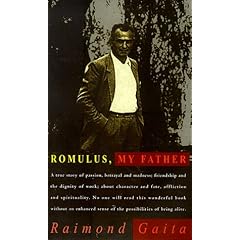
Amazon Link: Romulus, My Father
Written as a recollection, not as a present experience, this story spans 50 years in just over 200 pages. There is no room for detail, for sharing the journey, rather the reader bears witness and connects through empathy. It’s like sitting in an older person’s living room and listening to their life story – something I very much enjoy doing if the experiences are vastly different from my own, and these are. Through Raimond’s words, he offered me an opportunity to witness his childhood, the observations and interactions he had with his parents, family friends, and the wider relevance of immigrants assimilating into the Australian culture – something my own mother and grandparents did around the same time as Raimond’s.
Romulus Gaita (Raimond's father), an immigrant to Australia from Yugoslavia, lived an unthinkably difficult life. Raised with violence, Romulus knew pain, hardship, living without. He strived to shield his son from the same and this book proves his success. Through Raimond’s memories, I developed a deep respect for Romulus, his family, the people he interacted with and for the toll mental illness takes.
Romulus Gaita (Raimond's father), an immigrant to Australia from Yugoslavia, lived an unthinkably difficult life. Raised with violence, Romulus knew pain, hardship, living without. He strived to shield his son from the same and this book proves his success. Through Raimond’s memories, I developed a deep respect for Romulus, his family, the people he interacted with and for the toll mental illness takes.
Romulus chose a passionate woman in Christiana (Raimond’s mother), but she came with huge problems. Romulus’ pride, his high morals, his honour, prevented him from blaming her for her failures (and there were many), and it also had him supporting her when she betrayed him to another man (many other men, it seems). A lesser man would have cast her aside: Romulus did not because he said there is no worse fate than mental illness, and Christiana was deeply unwell. The pride and compassion of this man was inspirational, it highlights the difference between cultures and the generosity of spirit that allowed him to co-exist with Australians who did not immediately appreciate and share those virtues.
Raimond writes with pride, with strength, and I can’t help but share the admiration he holds for his father and for the people he writes about. As a child, Raimond experienced grief, loss, abandonment, confusion that no child should ever experience, yet he never doubted his father’s love for him, and he was never without support.
This story is amazing, made all the moreso because it’s true.
Rating ***1/2 (out of *****)
Raimond writes with pride, with strength, and I can’t help but share the admiration he holds for his father and for the people he writes about. As a child, Raimond experienced grief, loss, abandonment, confusion that no child should ever experience, yet he never doubted his father’s love for him, and he was never without support.
This story is amazing, made all the moreso because it’s true.
Rating ***1/2 (out of *****)



No comments:
Post a Comment